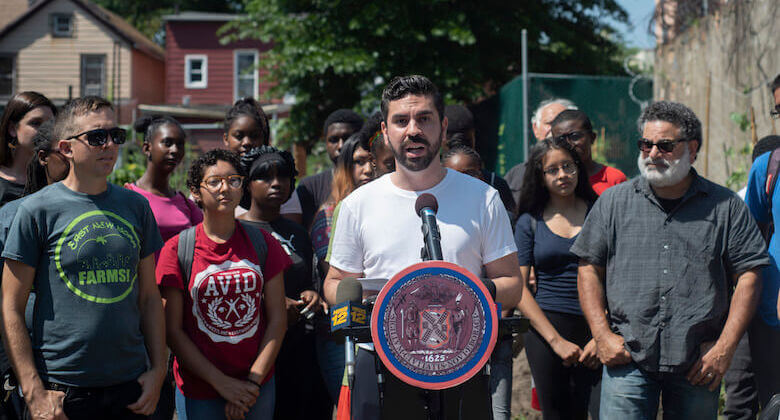
Editor’s note: We’re chronicling the innovations changing the way we eat and drink as we lead up to this fall’s Food Loves Tech. Our annual deep dive into the future of food and agriculture returns to Industry City on November 2–3, 2018 where both City Council Member Rafael L. Espinal Jr. and Brooklyn Borough President Eric Adams will join us as a panelists. Learn more and get your tickets here.
Almost a year after a bill to get New York City government more involved in promoting and supporting urban agriculture failed, local legislators are reviving the effort in a much more concerted way, this time with the support of a diverse group of stakeholders.
On Wednesday, City Council Member Rafael L. Espinal Jr. stood with community gardeners, urban farming advocates and students at the entrance to Ashford Street Abundant Garden in East New York.
“With the… many people who are here today, we are reintroducing legislation that would require the city to create a comprehensive urban agriculture plan,” Espinal announced, declaring that the city was missing an opportunity to grow urban farming in all five boroughs, “whether through zoning laws or bureaucratic hoops or lack of investment and incentives or the practice of taking away community garden licenses, we’re not doing enough to support these spaces that do so much for our ecosystem.“
He was also joined by Brooklyn Borough President Eric Adams, who is a vocal proponent for increasing healthy food access and is co-sponsoring the package of legislation. “The real weeds in the soil that we must pluck and remove are the countless regulations and lack of information that really is prolific throughout the entire system,” Adams said. “We have a real problem with food deserts, we have a real problem with lack of proper land space, we have a real problem of clarity… New York City can lead the way on urban farming if we deal with all the issues that we’re now seeing.”
The Legislation
Last summer, Espinal (with the help of Adams) introduced a bill that called on the city to create an urban agriculture plan, but the initiative failed to gain enough support to pass. Many community groups also felt left out of the process leading up to the creation of the legislation, claiming that it was written primarily to help new tech-based farming operations funded by venture capital expand, while spaces that had been nourishing low-income neighborhoods for years were ignored.
In the end, Espinal amended the bill to call only for a city website—which has since been created—that would provide resources on urban farming.
He was not deterred, however, from the original long-term goal, and the new package of legislation, introduced on August 8, includes three bills that tackle the needs of multiple sectors, with a much stronger emphasis on supporting community gardens.
https://www.instagram.com/p/BmHlsOngnYI/?taken-by=nyccgc_
The first, Int. No. 1058, revives the call for the Department of City Planning to create a comprehensive urban agriculture plan that would address things like cataloguing spaces that can be used for farming, reviewing land use and zoning as it relates to agriculture, the integration of urban agriculture into the city’s conservation plans, and much more, with an eye towards making it easier for business like rooftop farms to get started and succeed.
To support that plan, Espinal’s office worked with students at Columbia University’s School of International and Public Affairs last spring. The students did extensive research and engaged with various farms and community gardens all over the city to complete a detailed report on what an urban agriculture plan that would serve the city should look like. “We’re giving them [the city] the blueprints [for an urban agriculture plan],” Espinal said. “All they need to do is implement it.”
Read more: At the End of the 3 Line, East New York Farms! Grows
Espinal also introduced two other bills, Int. No 1059 and Int. No. 1060 that would support community gardens by having the city conduct a report on their current production and extending the periods of time before licenses could be revoked. Gardens’ licenses are often threatened by private and public housing development.
“We understand that housing is a serious issue in our city and especially here in East New York, but to have a thriving community, we must value the spaces that nourish us and not just house us,” Espinal said.
Advocates at the press conference said that value is often understated. “Too often community gardens are looked at as a temporary use of city-owned land before it’s developed or used for another purpose,” said David Vigil, project director at East New York Farms!. “Community gardens grow food for our farmers markets, they help train young people, they help collect food scraps to process into compost, they grow trees, they clean our air, they absorb storm water, and most importantly, they build community.”
In fact, Aziz Dehkan, the executive director of the New York City Community Garden Coalition, noted, gesturing towards the lush green space behind him, “The city still maps these parcels as vacant property… and we need to change that.”
Photo courtesy of the office of City Council Member Rafael L. Espinal Jr.



